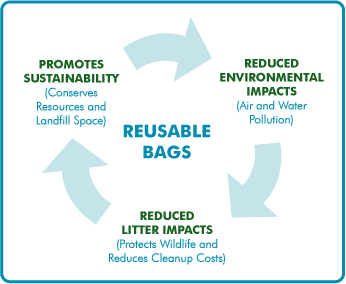
Marcus Gee, an international affairs columnist for the Globe and Mail, recently wrote an article criticizing Toronto’s new bylaw requiring all grocery stores to charge 5 cents for plastic bags. He writes “There is more sanctimony than sense behind this rule, which took effect Monday and which will require even the hard-pressed corner store guy to post signs explaining the five-cent charge.”
Other critics like Gee, also mention how plastic bags are recyclable and reusable anyway and serve multiple purposes. Marcus argues that they are especially useful for lining garbage bins. He thinks that we will have to buy plastic bags anyway whether from a grocery store or from another vendor to serve these various functions. One part of his article that is particularly irksome, erroneous and ill-informed is his discussion over landfills and waste diversion. “Modern landfills are marvels of environmental management that have next to no impact on the land around them. Impermeable, high-tech membranes prevent liquids from escaping into the groundwater. Methane is funnelled off and burned to produce electricity. “
Firstly, all modern landfills constitute “hazardous industrial waste landfill” and can be technical and scientific and therefore be exclusionary and esoteric to the general public. There are still a lot of uncertainties surrounding their impacts on groundwater, water quality and the environment generally. Further, they take up vast amounts of space, have no element of sustainability and produce a lot of social and environmental injustices. Additionally, many environmental law cases in Ontario deal with the controversies over landfills. The odour from the landfill site can permeate local farms and residential areas. Landfill odour can constitute a nuisance and unreasonable interference. It endangers life and health. Citizens have a lot of causes of actions (torts) that they can use for this very reason to sue and condemn the use of landfills.
Now, in terms of charging for plastic bags (something Gee thinks is preposterous), there are many benefits. In short, considering the number of shoppers in the metropolitan area, a five cent charge can induce citizens to change their behaviour. In addition, a user charge can persuade citizens to make the investment in buying reusable bags which are sturdier, compact and can carry a higher volume of groceries.
All the revenues collected from this five cent shopping bag charge will accumulate in the store’s budget, and it is expected that the money will be used for environmental projects. Again, “environmental projects and or funds” is quite nebulous. However, there can certainly be more regulation here whereby the municipal government monitors how these stores use their revenue. The biggest criticism of the 5 cent charge should not be its futility, but maybe how the 5 cents will be used. Economically, it makes sense. Chris and I both did some quick math on this in a previous post which you could see here.
Toronto wants to achieve a 70 percent diversion of waste from landfills by 2012. This is feasible. And achieving this will require a serious cut down on those ubiquitous disposable coffee cups, higher rates of composting, recycling and user charges like the 5 cent plastic bag fee. Regulatory measures are also significant for waste diversion and if the implementation of a bylaw reduces total waste generated, then a 5 cent charge certainly has merit. Marcus Gee may not approve of these various initiatives but they are all indispensable for achieving a higher waste diversion rate.
Key message: The real goal of such a bylaw is to promote sustainability through the use of reusable bags. Charging a small fee for plastic bags gets people thinking about the environment and provides an inclination and incentive to either consume less or make a switch to reusable bags.
Way to sock it to 'em.
ReplyDeleteAt first I thought his column was going to be semi-interesting, but as I read further I also realized it was "irksome, erroneous and ill-informed".
A few of the commenters mentioned that he routinely writes in the business sections and environmental knowledge is not quite his forte. But that is (reference to new Kia commercials...)